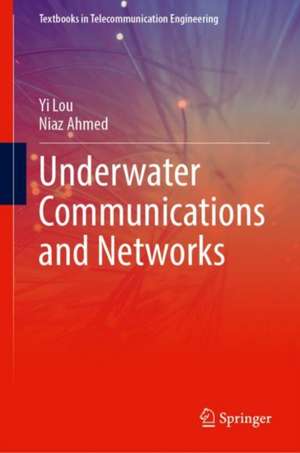Underwater Communications and Networks: Textbooks in Telecommunication Engineering
Autor Yi Lou, Niaz Ahmeden Limba Engleză Hardback – 16 noi 2021
| Toate formatele și edițiile | Preț | Express |
|---|---|---|
| Paperback (1) | 493.34 lei 6-8 săpt. | |
| Springer International Publishing – 17 noi 2022 | 493.34 lei 6-8 săpt. | |
| Hardback (1) | 520.68 lei 38-45 zile | |
| Springer International Publishing – 16 noi 2021 | 520.68 lei 38-45 zile |
Preț: 520.68 lei
Preț vechi: 642.82 lei
-19% Nou
Puncte Express: 781
Preț estimativ în valută:
99.63€ • 104.02$ • 82.46£
99.63€ • 104.02$ • 82.46£
Carte tipărită la comandă
Livrare economică 31 martie-07 aprilie
Preluare comenzi: 021 569.72.76
Specificații
ISBN-13: 9783030866488
ISBN-10: 3030866483
Pagini: 374
Ilustrații: XVII, 374 p. 227 illus.
Dimensiuni: 155 x 235 mm
Greutate: 0.73 kg
Ediția:1st ed. 2022
Editura: Springer International Publishing
Colecția Springer
Seria Textbooks in Telecommunication Engineering
Locul publicării:Cham, Switzerland
ISBN-10: 3030866483
Pagini: 374
Ilustrații: XVII, 374 p. 227 illus.
Dimensiuni: 155 x 235 mm
Greutate: 0.73 kg
Ediția:1st ed. 2022
Editura: Springer International Publishing
Colecția Springer
Seria Textbooks in Telecommunication Engineering
Locul publicării:Cham, Switzerland
Cuprins
Introduction.- Part I Underwater Acoustic Communication and Networks.- Basic principles of UWAC.- Modulation techniques in UWAC systems.- Signal processing techniques in UWAC systems.- UWA network technology.- UWAC Technology Limitations and Research Trends.- Part II Underwater Optical Wireless Communication and Networks.- Composition of the UWOC System.- Underwater Wireless Optical Channel model.- Pointing Acquisitioning and Tracking (PAT).- Performance of UWOCS.- System performance enhancement techniques.- Underwater Wireless Optical Network technology.- Research Trends in Underwater Wireless Optical Communication Technology.- Part III Underwater MI Communication and Networks.- Fundamental Principles of MI Communication.- Analog and Digital Communication.- Power Dissipation.- Challenges and Limitations.- Relaying Networks and MI waveguides.- Advancements and Applications.- Conclusion.
Notă biografică
Yi Lou received the B.Sc. degree in communication engineering from Jilin University, Jilin, China in 2009, and the M.Sc. and Ph.D. degrees in information and communication engineering from Harbin Institute of Technology, Harbin, China, in 2013 and 2017, respectively. He was a Visiting Student with the University of British Columbia, Kelowna, BC, Canada, in 2016. He is currently an Associate Professor with the College of Underwater Acoustic Engineering, Harbin Engineering University, Harbin, China. His research interests include energy harvesting wireless communications, underwater communications, cooperative communications, and cognitive radio networks.
Niaz Ahmed received his B.S. degree in telecommunication engineering from NUCES-FAST University, Islamabad, Pakistan, the M.S. degree in computer engineering from CASE University, Islamabad, Pakistan, in 2010 and 2012, respectively, and the Ph.D. degree in electrical engineering from Missouri University of Scienceand Technology, Rolla, MO, USA, in 2017. He is one of the pioneers in the field of Magneto Inductive communication for underwater wireless sensor networks. He has published articles in reputed and prestigious journals and international conferences. He is also being selected in the OES student poster competition for two consecutive times. He is currently an Associate Professor in Harbin Engineering University University, Harbin, China. His research interests include wireless communication, underwater wireless sensor network, magneto-inductive communication and embedded systems.
Niaz Ahmed received his B.S. degree in telecommunication engineering from NUCES-FAST University, Islamabad, Pakistan, the M.S. degree in computer engineering from CASE University, Islamabad, Pakistan, in 2010 and 2012, respectively, and the Ph.D. degree in electrical engineering from Missouri University of Scienceand Technology, Rolla, MO, USA, in 2017. He is one of the pioneers in the field of Magneto Inductive communication for underwater wireless sensor networks. He has published articles in reputed and prestigious journals and international conferences. He is also being selected in the OES student poster competition for two consecutive times. He is currently an Associate Professor in Harbin Engineering University University, Harbin, China. His research interests include wireless communication, underwater wireless sensor network, magneto-inductive communication and embedded systems.
Textul de pe ultima copertă
This textbook covers all related communication technologies of underwater wireless communication, such as acoustic communication, optical communication, and magneto-inductive communication. After describing each technology, the authors relay their pros and cons, as it is essential to learn the underlying mechanism, advancements, and limitations of these techniques. Therefore, this book provides basics fundamentals of the three technologies, their advantages and disadvantages, and their applications. The authors also introduce research trends, pointing readers in the direction of research in the field of underwater wireless communication. The book is an essential textbook for undergraduate and graduate students in the field of underwater communications. The book is also useful as a reference to undergraduate engineering students, science students, and practicing engineers. The book includes end-of-chapter questions and numerical problems.
- Combines underwater wirelesscommunication technologies such as acoustic communication, optical communication, and magneto-inductive wireless communication;
- Covers topics in a manner that a reader with little to no knowledge of the field can understand its primary underlying mechanisms;
- Includes end-of-chapter questions and numerical problems.
Caracteristici
Combines underwater wireless communication technologies such as acoustic communication Covers topics in a manner that a reader with little to no knowledge of the field can understand its primary underlying mechanisms; Includes end-of-chapter questions and numerical problems














